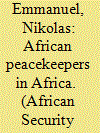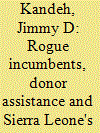| Srl | Item |
| 1 |
ID:
137191


|
|
|
|
|
| Summary/Abstract |
African states today are strongly encouraged by the United States (US) and other members of the international community to play a more central role in confronting crises on the continent. Indeed, in recent years African armed forces have increasingly served as the backbone supporting various peacekeeping operations in the region. It is important to add that the international community has frequently tried to facilitate the deployment of African armed forces with aid and training. From this reality, the following study goes beyond the current literature by focusing on the international factors behind African participation in United Nations (UN) peacekeeping operations in Africa. In doing so, this research focuses on US military aid and foreign troop training from 2002 to 2012, and its impact on African deployments into UN peacekeeping missions in Africa. As can be expected, such third-party help appears to be an important motivating factor encouraging African troop deployment into crises on the continent.
|
|
|
|
|
|
|
|
|
|
|
|
|
|
|
|
| 2 |
ID:
087364


|
|
|
|
|
| Publication |
2008.
|
| Summary/Abstract |
The removal of the governing Sierra Leone People's Party (SLPP) from power through the ballot box in 2007 represents a watershed moment in the growth and maturation of Sierra Leone's teething electoral democracy. This is because the peaceful alternation of political parties in power tends to strengthen democracy and nurture public confidence in elections as mechanisms of political change. In contrast to what happened in 1967, when the SLPP derailed the country's first post-independence democratic experiment by orchestrating a military coup after losing power in parliamentary elections, the SLPP in 2007 found itself isolated both internally and externally, and could rely neither on the support of a restructured army and police nor on external patrons like the United Kingdom which, among other things, suspended budgetary support for the government pending the satisfactory conclusion of the elections. The emergence of the People's Movement for Democratic Change (PMDC), whose membership consists largely of disaffected former SLPP members and supporters, and the electoral alliance forged between the PMDC and the All People's Congress (APC) in the presidential run-off, doomed any chance the SLPP may have had of holding on to power. The elections were referenda on the SLPP, which lost both the presidency and the legislature because its rogue leadership squandered the goodwill of the public, misappropriated donor funds with impunity, and failed to deliver basic social goods and services.
|
|
|
|
|
|
|
|
|
|
|
|
|
|
|
|